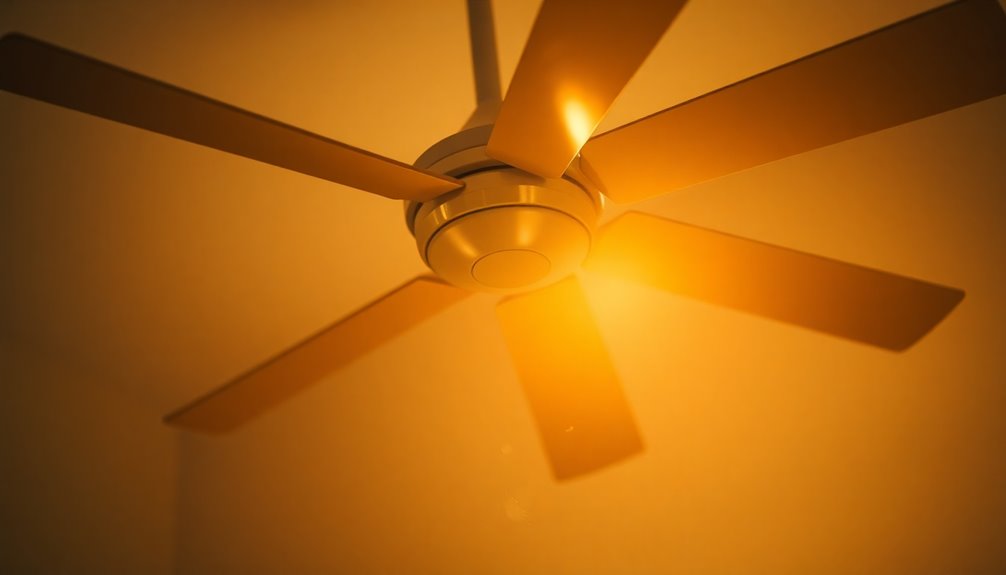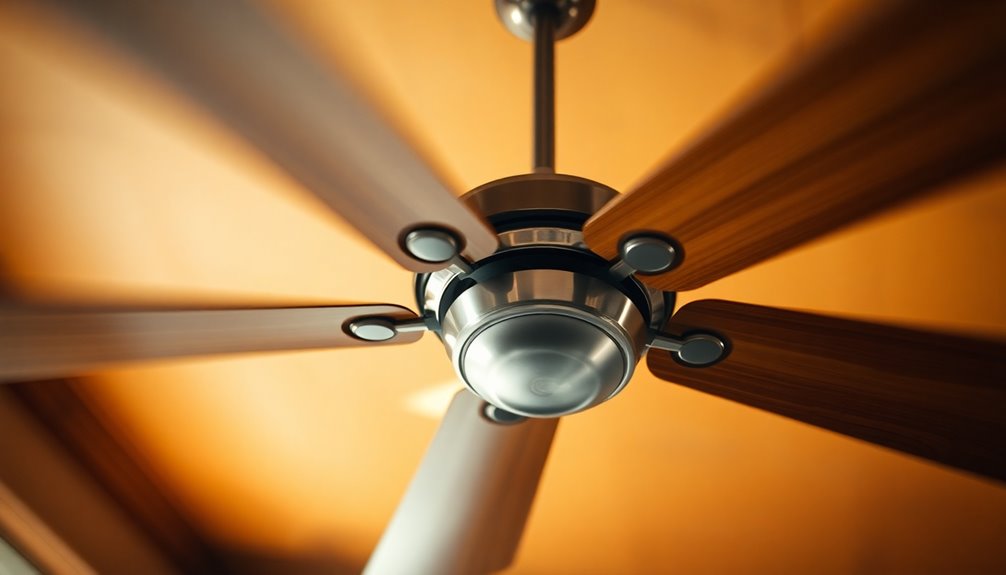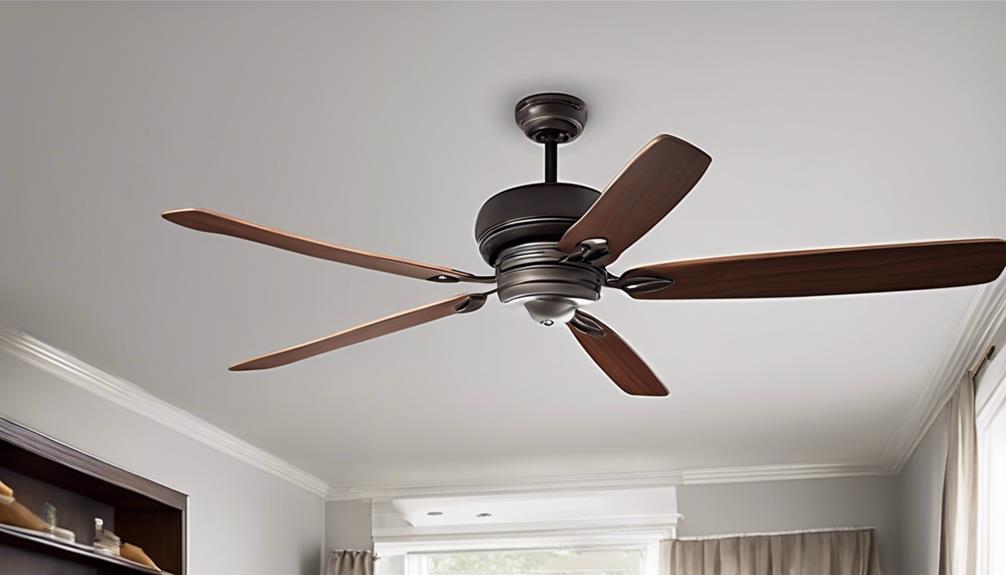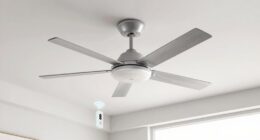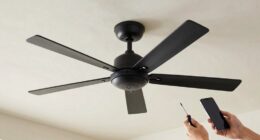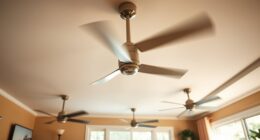If your ceiling fan is humming, it might be due to loose connections, insufficient lubrication, or electrical issues. Check for any wobbly blades or loose screws, as these can create vibrations. Another culprit could be incompatible dimmer switches that affect the fan's performance. Regular maintenance, like lubricating the motor and ensuring proper alignment of blades, can help reduce noise. If you've already tried fixing these issues and the humming persists, it could indicate deeper electrical problems that need professional attention. There's certainly more to uncover about how to resolve this pesky noise effectively.
Key Takeaways
- Loose connections or screws can create vibrations, leading to humming sounds in your ceiling fan.
- Insufficient lubrication in the motor increases friction, causing noise; regular maintenance is essential.
- Incompatible remote receivers or dimmer switches may cause voltage fluctuations, resulting in humming.
- Debris or obstructions in the motor or blades can interfere with operation, contributing to noise.
- Worn-out bearings or electrical issues, such as loose wires, may also result in persistent humming sounds.
Common Causes of Humming

When you notice a humming noise from your ceiling fan, it's often due to a few common issues. One primary cause could be loose connections within the fan's electrical system. If wires or screws aren't tightly secured, they may vibrate, generating that irritating humming sound. Regularly inspecting and tightening these connections can greatly reduce the noise.
Another reason for the humming could be insufficient lubrication in the motor. Over time, the motor can become poorly lubricated, increasing friction and causing noise. To combat this, make it a habit to clean and re-oil the motor periodically, ensuring smooth operation.
Incompatible remote receivers or variable speed controls can also contribute to humming. If these components aren't designed for your specific fan, they might create unwanted noise. Testing your fan directly connected to a power source can help identify if this is the issue.
Addressing these common causes—loose connections, lack of lubrication, and incompatible components—will keep your ceiling fan running quietly and efficiently, allowing you to enjoy its cooling benefits without the annoying humming noise.
Faulty Electrical Dimmers

Have you ever wondered why your ceiling fan hums more at night? One common culprit could be faulty electrical dimmers. When you use standard dimmer switches designed for lights, you may notice annoying ceiling fan noises, especially when the fan operates at lower speeds. These dimmers aren't meant for controlling fan speed, leading to that irritating humming noise you hear.
To tackle this issue, it's important to replace incompatible dimmers with fan speed controls specifically designed for ceiling fans. These controls can effectively eliminate the humming and buzzing sounds that disrupt your peace. Proper installation of these switches is vital as well; ensuring they're correctly set up won't only prevent electrical hum but also enhance the fan's overall performance.
If you're experiencing a persistent humming noise from your ceiling fan, it's a good idea to check your dimmer switches. Upgrading to compatible options can make a significant difference in your comfort level and restore the tranquility of your evenings.
Don't let faulty electrical dimmers ruin your relaxation—make the switch for a quieter, more enjoyable experience.
Weak Remote Receivers

If your ceiling fan's humming seems to kick in whenever you use the remote, a weak remote receiver might be to blame. This issue often arises when the remote receiver malfunctions, causing the fan to receive inconsistent signals. As a result, you may experience electrical interference, leading to that annoying humming ceiling noise.
To determine if the remote receiver is the culprit, try connecting the ceiling fan directly to a power source. If the humming stops, it's likely that the remote receiver is faulty. If you continue to hear the noise even after testing, you might need to replace the remote control. This can restore proper function and eliminate the unwanted sound.
Regular maintenance and checks on the remote receiver are essential to prevent these issues. By ensuring that the receiver is working properly, you can avoid the disruption of a humming ceiling and keep your fan running smoothly.
If you notice any signs of weakness in the remote receiver, act quickly. Fix a ceiling fan with a simple replacement or maintenance check to enjoy a quieter and more efficient experience.
Loose Blades or Light Fixtures

A ceiling fan's blades or light fixtures can often be the source of that irritating humming noise. If you've got a noisy fan, it's likely due to loose blades vibrating during operation. These vibrations signal that it's time to tighten those screws connecting the blades to the motor.
Regularly inspecting your fan's components is vital; loose blades can lead to increased noise levels, and it's an issue that's easy to overlook.
Don't forget about the light fixture, either. Loose screws in the light fixture can also contribute to that annoying hum. Make sure to give it a thorough check, as secure connections are important for a quiet fan experience.
By tightening all the screws, both on the blades and the light fixture, you can often eliminate the humming and restore peace to your environment.
Routine maintenance is key here. Addressing loose blades and light fixtures not only helps reduce unwanted noises but also prolongs the life of your ceiling fan.
Missing Fan Screws

Several missing screws can lead to significant instability in your ceiling fan, resulting in that bothersome humming noise. If you've noticed your ceiling fan is making unusual sounds, it's worth checking for any missing screws. Amateur installations often overlook these vital components, which can negatively impact performance.
To help you identify the problem, here's a quick reference table:
| Issue | Effect |
|---|---|
| Missing screws | Instability, humming noise |
| Loose screws | Vibrations, rattling sounds |
| Improper installation | Overall performance issues |
| Regular checks | Prevents noise and damage |
| Professional help | Guarantees proper installation |
Regularly inspecting for missing or loose screws is essential for maintaining your ceiling fan's functionality. By closely following the manufacturer's instructions during installation, you can confirm all screws are accounted for. If you're unsure or uncomfortable doing it yourself, hiring a professional electrician is a wise choice. They'll help you avoid issues related to missing screws and enhance your ceiling fan's longevity and performance. Don't let a simple oversight lead to annoying noise; take action today!
Poor DIY Installation

Missing screws can lead to instability, but poor DIY installation often exacerbates the problem, making noises more pronounced and distracting.
If you've noticed your ceiling fan humming or producing other common noises, it might be due to improper installation. When fans aren't mounted correctly, they can rattle or vibrate, which amplifies their sound.
Using non-approved hangers during installation can cause mechanical issues, increasing the likelihood of noise. If your fan isn't aligned properly with ceiling joists, you may experience irritating rattling sounds.
Misalignment of components can lead to uneven weight distribution, worsening vibrations and noise levels.
It's essential to verify that every part is securely fastened and that the fan is level.
If you're uncertain about your installation skills, consider hiring a licensed electrician. They possess the expertise to confirm proper mounting techniques, greatly reducing the chance of operational noise.
Diagnosing Ceiling Fan Noises

When your ceiling fan starts making noises, identifying the type of sound is your first step in troubleshooting.
Common noise types like humming or rattling can indicate specific issues, from wiring problems to loose connections.
Common Noise Types
Ceiling fans can produce various noises that signal different issues, with humming being one of the most common. Humming often indicates electrical problems, such as incompatible control systems or faulty wiring, which need prompt attention to avoid hazards. The source of the humming may originate from the fan's motor, especially if it's not lubricated properly or if debris is affecting its performance.
Here's a quick reference table for common ceiling fan noises:
| Noise Type | Possible Causes | Suggested Actions |
|---|---|---|
| Humming | Faulty motor or wiring | Inspect and lubricate motor |
| Buzzing | Incompatible dimmer switches | Replace with compatible controls |
| Rattling | Loose screws or parts | Tighten all loose components |
| Clicking | Obstruction in motor or blades | Clear any obstructions |
| Whirring | Worn-out bearings | Replace bearings if necessary |
Testing whether the humming persists when connected directly to the power source can help pinpoint if the issue lies with the remote receiver or control system. Regular maintenance, like tightening screws and lubricating the motor, is essential for preventing operational noises and ensuring peak performance.
Troubleshooting Techniques
To effectively troubleshoot humming noises from your ceiling fan, start by isolating the problem. First, check if the noise persists when the fan's connected directly to a power source. This step can help you determine whether the issue lies with the remote receiver or control system.
If the humming continues, inspect the fan motor capacitor for any loose wires or burn marks, as these could indicate electrical problems.
Next, don't overlook the potential impact of your dimmer switches or variable speed controls. Incompatible devices can lead to voltage fluctuations, causing humming noises. You should also test the fan at various speed settings; this can help you identify if the humming is speed-related.
Lastly, perform regular maintenance on your ceiling fan. Tightening any loose screws and lubricating the fan motor can prevent humming noises by ensuring all components work smoothly.
Fixing Buzzing or Humming

To fix that buzzing or humming noise, start by checking for any electrical issues, such as incompatible switches or incorrect light bulb wattage.
Next, make sure to tighten any loose connections in your ceiling fan, as these can contribute to unwanted sounds.
Addressing these points can help restore your fan to quiet operation.
Identify Electrical Issues
When you hear a humming or buzzing sound from your ceiling fan, it often points to underlying electrical issues that need addressing. One common culprit could be incompatible control systems, like dimmer switches that aren't designed for fan motor control. These switches can alter voltage levels, leading to those annoying sounds. Switching to standard ON/OFF controls might resolve this problem.
Another issue could be loose wire connectors. These can create noise and pose electrical hazards, so it's essential to regularly check and secure any connections.
If you've verified your controls and wiring but the humming persists, you might be dealing with a defective motor or capacitor. In such cases, reaching out to the manufacturer or a professional for evaluation is advisable.
Using appropriate speed controls designed specifically for ceiling fans can notably reduce electrical hum and improve overall performance.
Tighten Loose Connections
A secure installation is essential to a quiet ceiling fan, as loose connections can lead to annoying humming or buzzing sounds.
To tackle this issue effectively, follow these steps to tighten loose connections:
- Inspect the Fan Blades: Check for loose screws on the fan blades. Tightening these can considerably reduce vibrations, helping to keep your ceiling fan quiet.
- Examine the Mounting Bracket: Verify all screws on the mounting bracket are secure. A wobbly fan can produce humming from a ceiling fan that's not properly anchored.
- Check Wire Connections: Look inside the junction box for any loose wire connectors. Tightening these connections is vital for safe operation and can eliminate unwanted noise.
Using a screwdriver, carefully tighten loose connections, confirming you feel resistance without applying excessive force to avoid damaging the components.
Regular maintenance, like this, not only enhances the longevity of your ceiling fan but also keeps humming at bay.
Maintenance Tips for Fans

Ceiling fans can be a great addition to any room, but they require regular maintenance to keep them running smoothly and quietly. To reduce fan hum and extend the life of your fan, start by cleaning the blades and motor housing frequently. Dust buildup can create friction, leading to annoying noises.
Lubricate the motor and bearings periodically; this simple step guarantees smooth operation and minimizes humming.
Next, inspect all screws and connections on the fan and light fixtures. Tightening any loose components can prevent vibrations and rattling that contribute to noise.
Check the alignment of the blades, too. Misaligned blades can cause an imbalance, resulting in increased noise levels.
Lastly, perform periodic maintenance checks to identify potential issues before they escalate. Look for loose wiring or components that could lead to bigger problems down the line.
When to Call a Professional

If your ceiling fan's humming is accompanied by crackling or sizzling noises, don't hesitate to call a licensed electrician right away.
Persistent noise that doesn't go away with simple fixes should also prompt you to seek professional help.
Electrical safety is essential, so if you're unsure about any repairs, it's better to leave it to the experts.
Electrical Safety Concerns
Hearing a persistent humming noise from your fan can signal underlying electrical issues that might require a professional's touch.
It's crucial to take these sounds seriously to guarantee your safety and that of your home. Here are three critical scenarios when you should call a licensed electrician:
- Crackling or Sizzling Sounds: If you hear crackling or sizzling noises along with the humming, turn off the power immediately. These sounds often indicate severe electrical issues that could lead to fire hazards.
- Worn or Damaged Wiring: Regularly inspect your fan's wiring and connections. If you notice any burning, fraying, or damaged wires, it's important to seek professional help right away to prevent potential electrical failures.
- Incompatible Dimmer Switches: If your fan is connected to a dimmer switch, it mightn't be designed for fan control, causing a humming noise. Replacing the switch with an appropriate one often requires a licensed electrician's expertise.
If you're unsure about diagnosing or fixing electrical issues, it's always best to contact a professional.
Don't risk electric shock or further damage—your safety is paramount.
Persistent Noise Issues
Experiencing a persistent humming noise from your ceiling fan can be frustrating, and it often signals that something more serious is at play. If you've already tightened screws and checked for loose connections but the humming noise continues, it might indicate an underlying electrical issue.
A consistent humming sound that gets louder with increased fan speed could suggest a faulty motor or an incompatible control system, making it vital to seek professional assistance.
Additionally, if you hear crackling or sizzling noises along with the humming, don't wait—this could signify serious electrical problems that require immediate attention. It's important to prioritize safety in these situations.
Regular maintenance checks can help identify minor issues before they escalate, but if you're unsure about the fan's electrical components, it's wise to consult a licensed electrician.
If the humming persists despite your troubleshooting efforts, especially considering the fan's age or condition, don't hesitate to call in a professional. They can provide a thorough diagnosis and guarantee your fan operates safely and effectively, preventing potential hazards down the line.
Frequently Asked Questions
How Do I Stop My Ceiling Fan From Humming?
To stop your ceiling fan from humming, start by checking for compatibility issues with dimmer switches, since they can cause noise.
Next, inspect and tighten any loose screws on the fan blades and light fixtures, as vibrations can lead to humming.
Make sure the motor's properly lubricated, too.
If you're using a remote, try connecting it directly to power; if the humming stops, the remote might need replacing.
Consider replacing the capacitor if problems persist.
How Do I Stop My Fan From Buzzing?
To stop your fan from buzzing, you'll want to first investigate potential causes.
Check that your controls are compatible, as mismatched dimmers or speed controls can create noise.
Next, tighten all screws to eliminate loose connections that might cause vibrations.
Inspect the motor for debris and ascertain it's lubricated properly.
If the buzzing continues, consider replacing any faulty remote receivers or consult an electrician for deeper issues.
What Is the Humming Sound of a Fan?
The humming sound you hear from your fan typically indicates some underlying issues.
It might come from electrical incompatibilities, like with dimmer switches or speed controls. Loose connections can also create that noise, as well as poorly lubricated motors.
If your fan's remote isn't compatible, it could add to the problem too.
Regular maintenance, checking for loose screws, and proper lubrication can help reduce that humming sound and improve your fan's performance.
Why Is My Hunter Fan Making a Humming Sound?
Your Hunter fan's humming might feel like a persistent buzz in your ear, distracting you from relaxation.
This sound often stems from the motor, especially if it's not properly installed or maintained. Check for loose screws and verify the speed controls are compatible.
Sometimes, poor lubrication causes this noise, so re-oiling may help. If the humming continues, consider reaching out to customer support or a licensed electrician for further assistance.
Conclusion
To sum up, a humming ceiling fan can be more than just an annoyance; it could signal underlying issues that need addressing. By identifying the cause, whether it's loose blades or faulty dimmers, you can restore peace to your space. Isn't it frustrating when something so simple disrupts your comfort? Take the time to diagnose and fix the problem, and don't forget regular maintenance to keep your fan running smoothly. If all else fails, don't hesitate to call in a pro!
